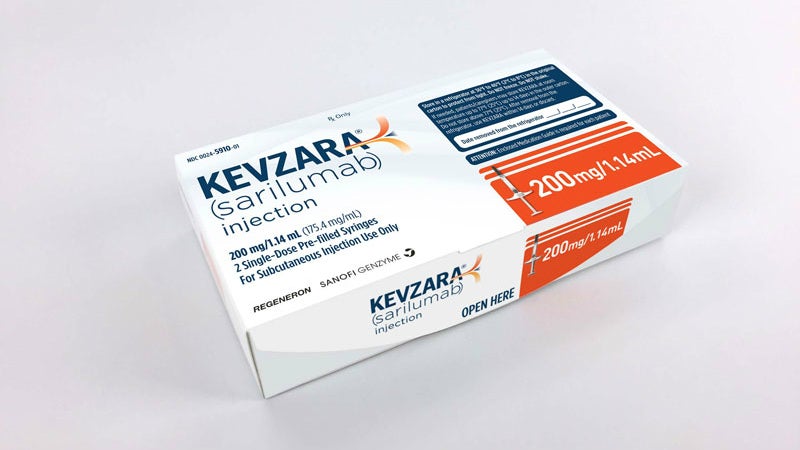
Like many firms in the pharmaceutical sector, Regeneron has turned a great deal of attention towards the fight against Covid-19 in recent weeks and months.
Having already entered one of its existing drug therapies into clinical studies to test its efficacy against the virus, Regeneron has also announced the start of trials for a novel antibody cocktail, which could help treat hospitalised patients, or prevent Covid-19 in uninfected people.

Discover B2B Marketing That Performs
Combine business intelligence and editorial excellence to reach engaged professionals across 36 leading media platforms.
We take a closer look at the US biotech firm, and its ongoing attempts to uncover an effective treatment for the novel coronavirus.
History of Regeneron
Regeneron was co-founded in 1988 by its current CEO Dr Leonard Schleifer — a neurologist and assistant professor at Cornell University Medical College in New York.
The company’s name is derived from its initial sole focus on gene technology, and regenerating neurons in the human body.

US Tariffs are shifting - will you react or anticipate?
Don’t let policy changes catch you off guard. Stay proactive with real-time data and expert analysis.
By GlobalDataBut it has since turned attention to several other areas within healthcare including cancers, eye conditions, cardiovascular diseases and pain relief.
In the early 2000s, the company also introduced its proprietary Veloci technologies, which are designed to accelerate the traditional drug discovery timeline.
In 2006, Regeneron’s first fully human antibody drug, sarilumab, entered into clinical development before receiving US Food and Drug Administration (FDA) approval as a rheumatoid arthritis treatment in 2017.
Since 2007, the company has also collaborated with French pharma giant Sanofi on numerous projects — as well as entering into an agreement with the American government to develop an antibody treatment for the Ebola virus in 2015.
To date, Regeneron has had seven different medicines approved by the FDA. It is currently one of the biggest biotech firms in the world — according to US market research firm Investopedia — with a market value of close to $50bn and more than 8,000 employees worldwide.
The company’s base is in Tarrytown, New York, although it also has offices across the US, UK and Ireland.
Sarilumab collaboration with Sanofi
Regeneron announced on 16 March it had started clinical trials of sarilumab — also known by its trade name Kevzara— in hospitalised patients with severe Covid-19.
These trials were undertaken after preliminary data from a single-arm study in China suggested that antibodies could prevent overactive inflammation in the lungs of severely ill coronavirus patients by inhibiting the interleukin-6 (IL-6) pathway — which plays a role in the body’s immune response.
Regeneron has worked with Sanofi to conduct the double-blind Phase II/III trials in multiple medical centres across New York.
On 30 March, the two firms announced the first patient outside of the US had been treated with sarilumab as part of Phase II/III trials across Italy, Spain, Germany, France, Canada and Russia.
Regeneron is currently leading clinical trials for the drug in the US, while Sanofi is leading all those taking place outside the US.
As of Regeneron’s most recent update on 27 April, a total of 457 hospitalised patients in the US have been assessed, and categorised as either having a “severe” illness, a “critical” illness, or “multi-system organ dysfunction”.
As part of that update, Regeneron announced that testing in “severe” patients — the least advanced of the three categories — had been discontinued after “negative trends” were observed in preliminary Phase II analysis of the group.
However, the update also said that “positive trends” for all outcomes had been seen in the “critical” group of patients, and no new safety signals in treating Covid-19 with sarilumab had been observed thus far.
Novel antibody cocktail for Covid-19
While there have been no fresh updates on the sarilumab trials for close to two months, Regeneron has announced the start of its clinical trials for REGN-COV2 — an anti-viral cocktail containing two antibodies — on 11 June.
These trials will assess the safety and efficacy of the dual-antibody cocktail as a treatment, and a preventative measure, for Covid-19.
By binding non-competitively to the critical receptor-binding domain (RBD) of the SARS-CoV-2 virus’ spike protein, the two antibodies may also be able to inhibit the virus’ ability to mutate and escape treatment — which is critical in dealing with the current pandemic, according to Regeneron.
The REGN-COV2 trials consist of four separate study populations: hospitalised coronavirus patients, non-hospitalised symptomatic coronavirus patients, uninfected people in groups at high risk of exposure, such as healthcare workers or first responders, and uninfected people with close exposure to a coronavirus patient, such as a patient’s housemate.
Regeneron co-founder, president and chief scientific officer Dr George Yancopoulos said: “REGN-COV2 could have a major impact on public health by slowing spread of the virus and providing a needed treatment for those already sick – and could be available much sooner than a vaccine.
“The antibody cocktail approach may also have long-term utility for elderly and immuno-compromised patients, who often do not respond well to vaccines.
“Ultimately, the world needs multiple solutions for Covid-19, and the innovative biopharma industry is collectively working hard to help as many people as possible with a variety of complementary approaches.”
Ever since the novel coronavirus first began to spread throughout populations across the world in early-2020, Regeneron scientists have been evaluating thousands of fully-human antibodies produced using the company’s Veloci technologies.
These antibodies were developed in genetically-engineered mice and isolated from human Covid-19 survivors. In mid-April, the two most potent, non-competing and virus-neutralising of these antibody candidates were scaled-up for clinical use.
Regeneron is now scaling-up production to have hundreds of thousands of preventative doses, or tens of thousands of treatment doses, per month by the end of August. It is also actively seeking ways to maximise its production capacity — within the company and beyond.





